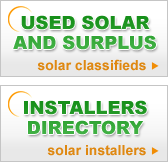Local option property tax exemption for renewable energy:
-Renewable energy systems are allowed a property tax exemption of
the assessed value of the system in the state of New Hampshire.
-Qualifying renewable systems include solar energy, wind energy and
wood-fired central heating systems.
Renewable energy rebate program:
-This New Hampshire rebate program is for residents who install a
solar photovoltaic system or a wind energy system.
- The rebate for photovoltaics is equal to $3 per watt of generation
capacity up to 50% of the system costs or $6,000, which ever is less.
-The system must be under 5kW to be eligible.
Solar thermal rebate program – National Grid:
-All residents who install a solar thermal system such as, solar
water heating or solar space heating are eligible to participate in
this utility rebate program funded by National Grid.
-Eligible customers of National Grid may apply for a rebate of 15%
off all costs of the solar thermal system up to $1,500.
-Participants must share their data of water heating usage for 12
consecutive months in order to receive the rebate.
Solar and wind energy rebate program –
New Hampshire
Electric Co-Op:
-Residential customers of New Hampshire Electric who install renewable
systems such as photovoltaics, wind energy or solar water heat are
eligible to receive financial incentives in the form of a rebate.
-Customers who install solar photovoltaics receive a rebate of $3.00
per installed watt up to $3,500.
-Customers who install a solar water heating system receive a rebate
of 25% of the system cost up to $1,500.
-Customers who install a wind energy system receive a rebate of 25%
of the system cost up to $3,500.
-Projects must be pre approved to receive a rebate.
Net metering:
-The state of New Hampshire requires all electric utilities to offer
homeowners and businesses who have renewable energy systems that generate
electricity the option of net metering.
-Systems must be 100kW or less
-The financial incentive given by the utility is 1% of the annual
peak energy demand.
-The incentive is given as a credit on each month’s bill.
Residential renewable energy tax credit:
-This personal tax credit allows the taxpayer to claim a credit of
30% of expenditures including labor costs and installation of qualified
residential solar-electric systems, solar water heating systems or
fuel cells. Small wind-energy systems and geothermal heat pumps can
also be accredited for.
-Solar-electric systems and solar water heaters have a maximum incentive
of $2,000 if placed in service before 2009. There is no maximum incentive
for systems placed after 2008.
-The excess amount of the federal tax credit may be carried forward
to the next taxable year if it exceeds tax liability.
-This can be carried forward until 2016, but after that, it is unknown
if the unused credit will be able to be forwarded. Residential energy conservation subsidy exclusion:
-This is a personal exemption of 100% of energy conservation subsidies
provided by public utilities.
-The value of a purchase or installation of any energy conservation
measure by a customer such as solar water heat, solar space heat or
photovoltaics will not be included in the customer’s gross income.
-Customers of an electric utility company, who participate in the
utility’s energy conservation program, may receive a rate reduction
of electricity furnished or a nonrefundable credit against the purchase
price of the electricity on each monthly electric bill.
Energy-efficient mortgages:
-This is a federal loan program where homeowners can use EEM (energy-efficient
mortgages) to finance renewable energy technologies in a home.









